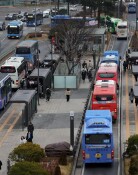Civil Service Commission Labor Costs Increase 10-Fold
Civil Service Commission Labor Costs Increase 10-Fold
Posted November. 17, 2007 08:45,
Since the Roh Moo-hyun administration took office, labor costs in four government agencies have doubled. In particular, the labor costs of the Civil Service Commission have soared 10-fold in that span.
In addition, eight government organizations saw their number of staff increase by 50%, compared to the end of 2002, right before the current administration launched.
This newspaper reported the news on Friday after comparing the number of public servants in each government organization with increases in the budget allocated to labor costs based on reports such as Increases in Public Service Personnel drawn up by the Ministry of Government Administration and Home Affairs, and Changes in Personnel Expenses by Agencies by the Ministry of Planning and Budget.
Soaring Personnel Expenses in Government -
In 2003, the first year the present government took off, the total labor cost for public officials was 16.76 trillion won, but that will increase 39.3% (a 6.6 trillion won increase) to 23.36 trillion won next year, according to the budget plan for 2008 submitted to the National Assembly. For the sake of objectiveness of the analysis, the newspaper excluded labor costs for employees of the Korea Railroad in 2003 (that was turned into a state-run company in 2005) and public teachers whose labor costs are considered subsidies.
Among governmental agencies, the Civil Service Commission saw its labor costs increase the most--a 932.4% rise, from 3.7 billion won in 2003 to 38.2 billion won in 2008. That was followed by costs in the Ministry of Labor (119.6%), Ministry of Gender Equality and Family (119.5%), and the Korea Food and Drug Administration (108.5%).
The labor costs for the Ministry of Planning and Budget, where former presidential secretary for policy Byeon Yang-gyun served as minister, rose 97.2%, and the Presidential Secretariat will pay its staff 27.7 billion won next year, a 56.4% increase from 17.7 billion won in 2003.
The Civil Service Commission and the Ministry of Planning and Budget stand out-
The number of public service personnel grew from 532,750 (excluding that of the Korean Railroad) in late 2002 to 603,721 as of August 14, 2007, a 13.3 increase (70,971).
The Civil Service Commission recorded the biggest increase, 421.6%, from 86 to 433. It is followed by the Ombudsman of Korea (192.3%), the Government Youth Commission (184.7%), the Ministry of Labor (103.6%), the Office for Government Policy Coordination (81.6%), the Korean Food and Drug Administration (69.5%), the Ministry of Planning and Budget (61.5%), and the Korea Independent Commission Against Corruption (50.3%).
In the case of the Civil Service Commission, the increase in labor cost is larger than the increase in personnel because the cost for some 150 interns who will be hired next year is included in labor cost, but they are not deemed civil servants, explained an official of the Ministry of Planning and Budget. By contrast, the number of civil servants in the Ministry of Government Administration and Home Affairs, the Ministry of Defense, and the Public Procurement Service dropped 10.9%, 2.5%, and 2.3%, respectively.
Calls for a small, effective government
Experts say that the governments pursuit of big government, ignoring the global trend for a small government, caused negative consequences and call for a bold reforms.
Kim Dong-uk, a professor at Seoul National University, said, As with the Kim Dae-jung administration, the present administration has made the organization of the government big and heavy by splitting it into pieces. It should be made light and the central government should delegate its excessive duties to local governments.
Professor Kims view was echoed by senior analyst Cho Seong-bong at the Korea Economic Research Institute. He emphasized that governmental organizations should be merged because many functions in government departments overlap.
higgledy@donga.com cha@donga.com







